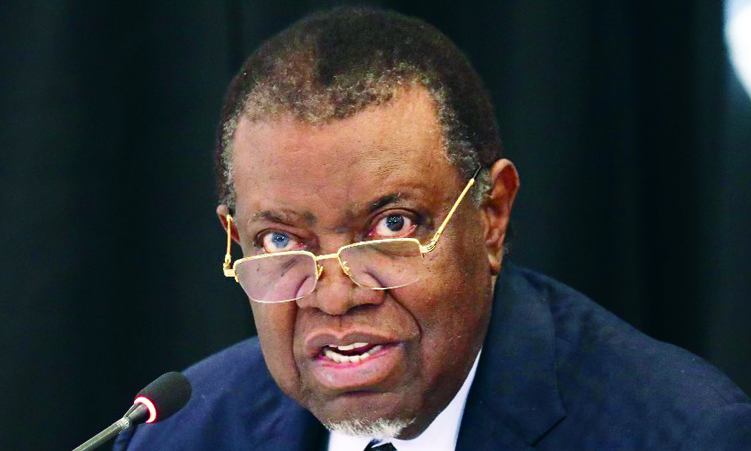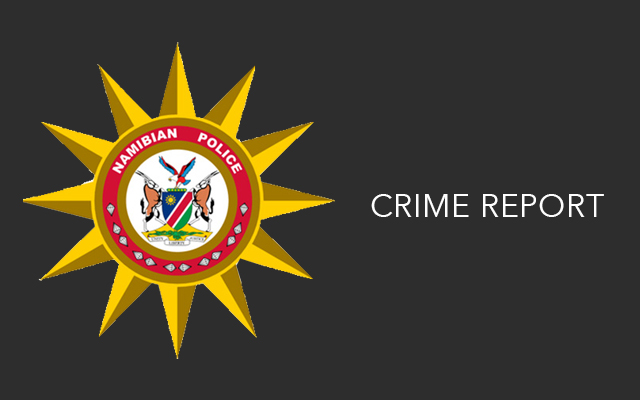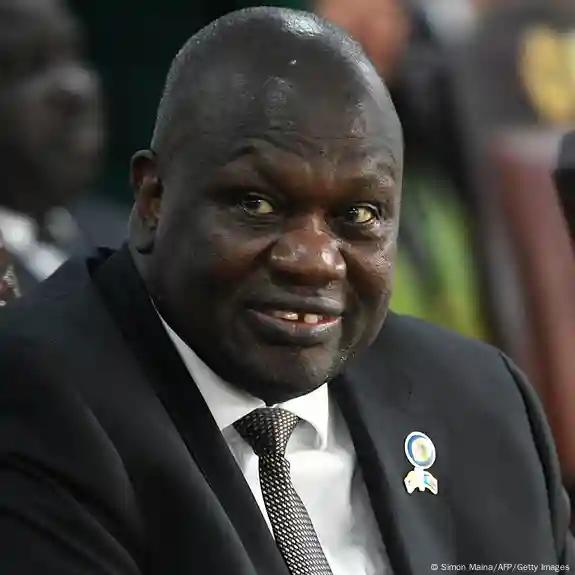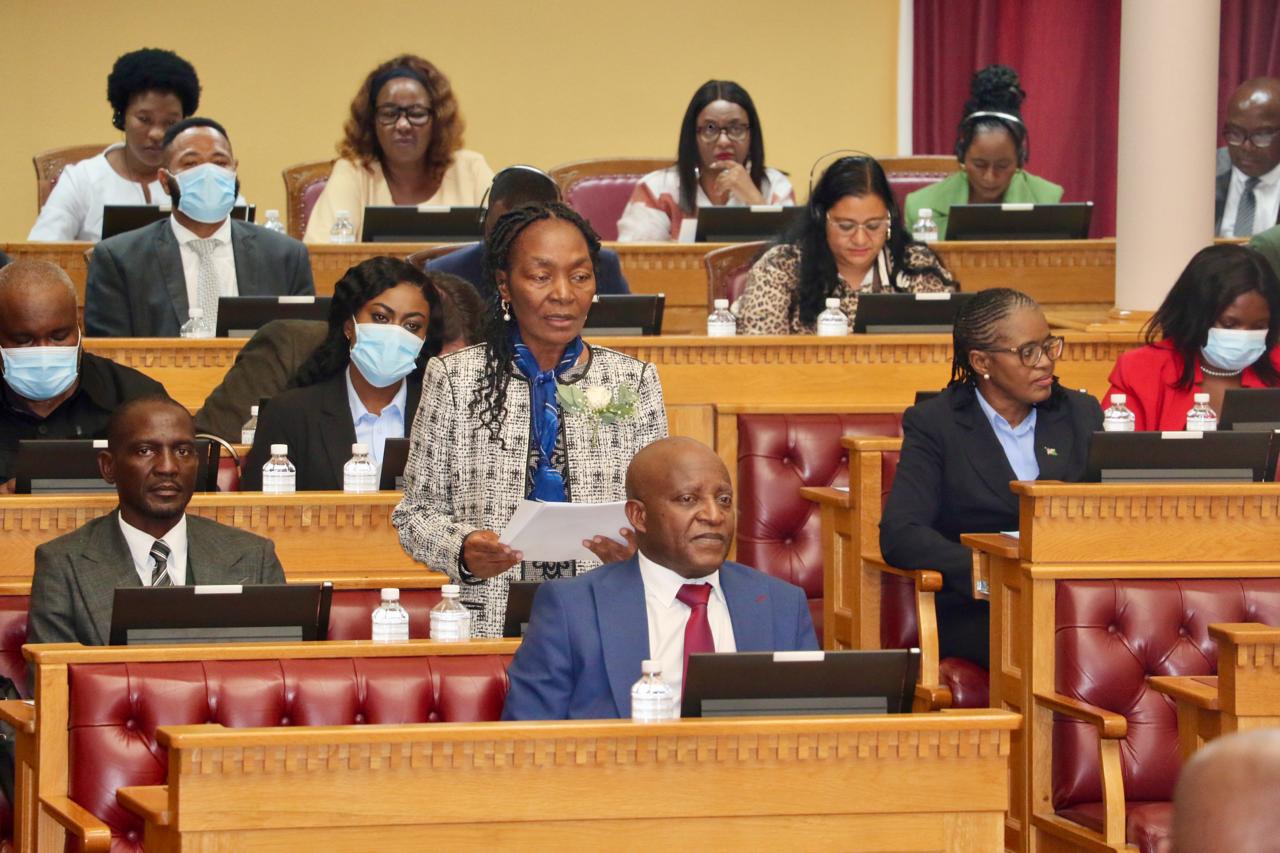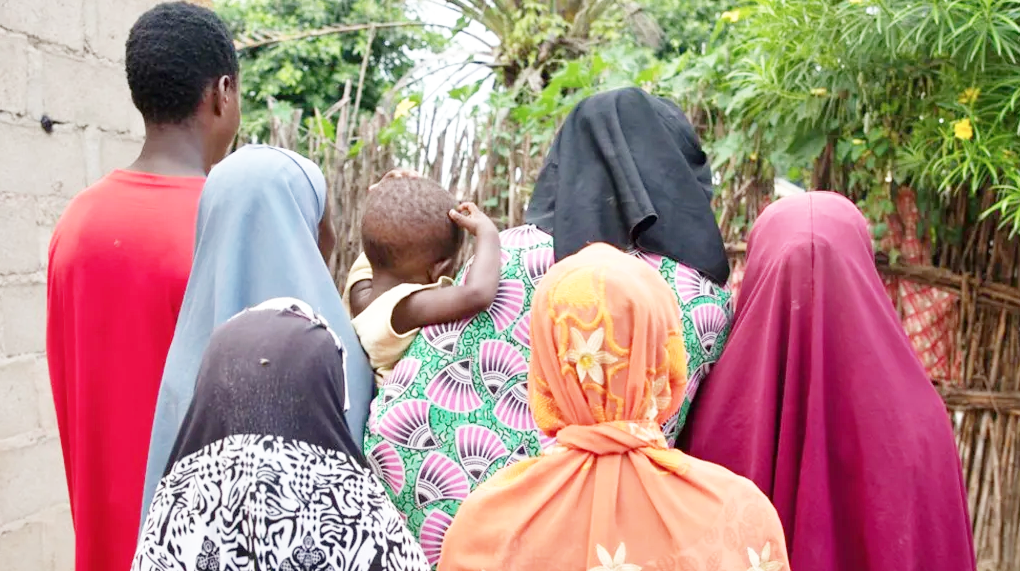From the official programme for his state funeral
Following the sixth national democratic elections in 2014, where Hage Geingob won the presidential vote by 87%, president Geingob was sworn into office on 21 March 2015 as the third president of the Republic of Namibia.
In 2019, during the seventh National Assembly and presidential elections, president Geingob was re-elected to a second term in office.
Geingob was also the third president of the ruling party, Swapo, following his election at the sixth Swapo Party Ordinary Congress in November 2017.
At the seventh ordinary congress of the Swapo Party in 2022, president Geingob was re-elected as president of Swapo.
From 2015 to 2024, Geingob led Namibia during a difficult period, providing steady leadership throughout an economic downturn occasioned by the global commodity crisis of 2014; severe droughts between 2015 to 2019, recorded to have been the worst in the history of Namibia, including the Covid-19 pandemic, which affected many sectors of the economy from 2020 to 2022.
Born on 3 August 1941 in the district of Grootfontein, Geingob began his schooling at Otavi in 1948. In 1958 he attended Augustineum College, where the first seeds of political consciousness were planted.
As a pupil at the school, the young Geingob led a strike against the unfair treatment of students. In 1961, he completed his teachers’ training, after which he started teaching at Tsumeb.
It was at Tsumeb where he started taking part in Swapo activities, joining the party officially in 1962.
In December 1962, Geingob left Namibia (then South West Africa) for exile, commencing in Botswana, where he joined other freedom fighters in pursuit of Namibia’s independence.
Geingob left Botswana for Léopoldville (Kinshasa) in the Congo and was eventually offered a scholarship in 1964 to go to the United
States of America, where he schooled at Temple University.
While in the United States, Geingob was appointed as Swapo’s representative to the Americas and the United Nations. Combining
his duties as a freedom fighter and petitioner to the United Nations, Geingob obtained a bachelor’s degree in political science from Fordham University, New York, in 1970 and later read for a masters degree in international relations at the New School for Social Research in 1974.
He obtained a doctorate in philosophy from Leeds University in the United Kingdom in 2004, with his thesis titled, ‘State Formation in Namibia: Promoting Democracy and Good Governance’.
In 2015, Geingob received honorary doctorate of humane letters from his alma mater, Fordham University.
A recipient of many international awards in recognition of his exceptional leadership in different areas of human endeavour, Geingob was also the recipient of the Order of José Martí award for outstanding leadership from the government of the Republic of Cuba.
Following the termination of the South African mandate over Namibia in 1966, the United Nations (UN) assumed direct responsibility and
subsequently established the UN Council for Namibia, which led to the creation of the UN Institute for Namibia (Unin) in Lusaka, Zambia.
Geingob was assigned by Swapo to be a member of the UN Namibian team as a political affairs officer.
On the recommendation of Sam Nujoma, the president Swapo, Geingob was appointed director at Unin from 1975 to 1989, an institution he established and whose core function was sectoral policy research and to train cadres for the future civil service for an independent Namibia.
In 1989, he was chosen by the Swapo leadership to lead a cohort of senior Swapo leaders and Namibians in exile to Namibia under the UN Security Council Resolution 435.
Following the successful UN supervised elections in 1989, where he held the position of director of elections of Swapo, Geingob was elected to be the chairman of the Constituent Assembly, the body that was responsible for drafting the Constitution of the Republic of Namibia.
At independence on 21 March 1990, Geingob was appointed as the first prime minister, where he dismantled the apartheid administrative system in favour of an inclusive public service geared towards serving the interests of all Namibians.
Geingob served for 12 years in the position of prime minister, before taking a brief hiatus from the political sphere.
In 2005, Geingob returned to active politics and served as Swapo chief whip in the National Assembly and also chaired the parliamentary standing committee of economics.
Following his election in 2007 as vice president of Swapo, in 2008 Geingob was appointed as the trade and industry minister. As
minister, Geingob spearheaded the small and medium enterprises (SME) assistance through the equipment aid scheme, the industrial policy and the creation of the SME Bank.
Geingob was elected as vice president of Swapo during the Swapo Party Congress in November 2007. In 2012, Geingob was re-elected in the position, following which he was reappointed as prime minister in 2012 until his election as president of Namibia in November 2014.
A fervent defender of the unity of the Namibian people, his themes are: ‘Inclusivity spells harmony, exclusivity spells conflict’; ‘One
Namibia, one nation’ and ‘No one should feel left out of the Namibian house’.
A proponent of partnership in government and enhanced transparency and accountability in the public service, Geingob led the creation of the Anti-Corruption Commission as prime minister in the 1990s.
Concerned with the acceleration of development and prosperity for the Namibian people, president Geingob initiated the Harambee Prosperity Plan I and II, with the stated objective of strengthening Namibia’s effective governance architecture, the social progression of the vulnerable, economic and infrastructure advancement for Namibia, as well as the enhancement of Namibia’s position in international affairs.
Geingob championed the continental recognition of green hydrogen as a strategic vector for Africa’s green industrialisation and a key component for combating climate change.
As head of state, Geingob spearheaded the creation of the Welwitschia Sovereign Wealth Fund for Namibia to ensure intra and intergenerational equity from the nation’s natural resources.
On 16 January 2024, president Geingob was diagnosed with cancer, which he communicated to the Namibian public on 19 January 2024. President Geingob died on 4 February 2024.
Geingob is survived by his wife Monica Geingos, eight children, three grandchildren, two siblings and numerous nieces and nephews.
Stay informed with The Namibian – your source for credible journalism. Get in-depth reporting and opinions for
only N$85 a month. Invest in journalism, invest in democracy –
Subscribe Now!




